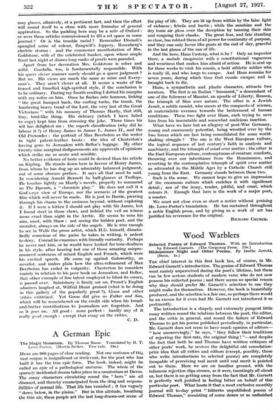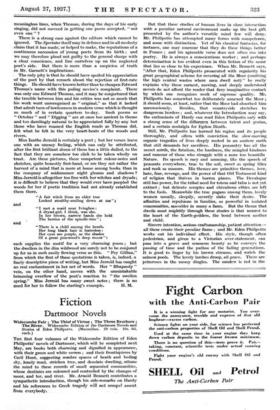Wood Warblers
Midsummer Night and Other Poems. By lanthe Jerrold. (Bonn. Is.) THE chief interest in this first book lies, of bourse, in Mr. Edward Garnett's introduction. The genius of Edward Thomas went mainly unperceived during the poet's lifetime, but there
can be few serious students of modern verse who do not now possess his collected poems ; and there seems no special reason why they should prefer Mr. Garnett's selection to one they might make for themselves. However, the book is beautifully produced, and the selection is a fair one, so perhaps there would be an excuse for it even had Mr. Garnett not introduced it so pertinently.
The introduction is a shapely and extremely pungent little essay written round the relations between the poet, the editor, and the critic in general, and round the failure of Edward Thomas to get his poems published periodically, in particular. Mr. Garnett does not seem to have much opinion of editors- " how unswervingly;" he says, " they follow their traditions of rejecting the first-rate, the original thing ! "—and despite the fact that both he and Thomas have written critiques of other poets' work, he revives the delightful old consolatioh- prize idea that all critics and editors (except, possibly, those Who write introductions to selected poems) are completely incapable of perceiving real merit until real merit is pointed out to them. Here we are on familiar ground, with the infamous rejection slips strewn, as it were, tauntingly all about us, but there is no getting away from the fact that Mr. Garnett is perfectly well justified in feeling bitter on behalf of this particular poet. What boots it that a most exclusive monthly journal will to-day print "hitherto unpublished poems of Edward Thomas," consisting of some dozen or so unfinished
meaningless lines, when Thomas, during the days-of his early singing, did not succeed in getting one poem accepted, " not even one " ?
There is a strong case against the editors which cannot be ignored. The Spectator itself may in defence and in all modesty claim that it has made; or helped to make, the reputations of a
• continuous succession of young poets from its birth ; and we may therefore plead not guilty to the general charge with a clear conscience, and line ourselves up on the neglected poet's side. But there is more than a suspicion of truth in Mr. Garnett's implications.
The only pity is that he should have spoiled his appreciation -of the poet by that remark about the rejection of first-rate things. He should have known better than to cheapen Edward Thomas's name with this puling novice's complaint. There was only one Edward Thomas, and it may be conjectured that the trouble between him and his critics was not so much that his work went unrecognized as " original," as that it lacked that adroit turn of lawlessness in modern verse which is thought so much of in certain quarters to-day. Such poems as " October " and " Digging " are at once too ancient in theme and too dazzlingly natural to be appreciated fully by any but those who have roamed the English roads as Thomas did, felt what he felt in the very heart-beats of the woods and rivers.
Miss lanthe Jerrold is certainly a poet ; but her verses leave one with an uneasy feeling, which can only be attributed, after the first brilliant sheen of them has a little dulled, to the fact that they are somehow too slick to be taken wholly on trust. Are these pictures, these competent colour-notes and sketches, quite honestly first-band, or are they not rather the harvest of a mind that is more at home among books than in the company of midsummer night gleams and shadows ? Miss Jerrold is altogether too free with her witches and dryads; it is difficult to believe that they would ever have peopled the woods for her if poetic tradition had not already established them there.
"A fair witch from an elder tree Looked stealthy-smiling down at me";
and
"I met a maid near Ivinghoe: A dryad-girl; I think, was she.
In her brown, narrow hands she held The berries of the spindle-tree";
and
"There is a child among the heath: Her long black hair is Instrehess: Her eyes are purple, as the shades
Of a great pinewood's deep recess":
each supplies the motif for a very charming poem ; but the dwellers in the dim wildwood are surely not to be conjured up for us in such easily flowing verse as this. " Fey Gillian," from which the first of these quotations is taken, is, indeed, a finely descriptive piece of writing, but Miss Jerrold has caught no real enchantment in her net of words. Her " Rhapsody " vein, on the other hand, moves with the unmistakable brimming overflow of the poet's reaction to " the swollen spring." Miss Jerrold has many sweet notes ; there is no need for her to follow the starling's example. H. M.



































 Previous page
Previous page